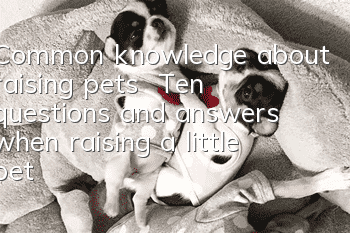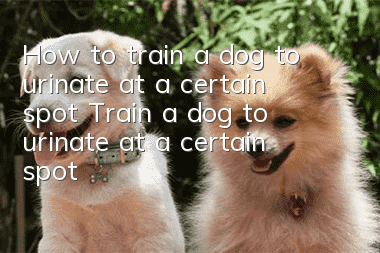Common knowledge about raising pets | Ten questions and answers when raising a little pet at home

1. Why do puppies like to bite things?
After weaning, when the puppy is about one month old, it will be very itchy when its teeth are growing; when it is four or five years old, it will also be very itchy due to the replacement of teeth; it must be at least eight or nine years old when the permanent teeth are complete. When it stops growing, it gradually stops itching. During this period, they will bite things to relieve the itching. When you become an adult, you won’t bite randomly anymore. If it bites again, it may be due to psychological factors, such as insecurity, loneliness, and wanting to find an owner.
2. Why can’t puppies eat salty food?
Feeding your dog too much salty food can cause kidney and heart problems over time, and may also cause tear stain syndrome. Human food is too salty for dogs, so it is recommended to eat professional dog food.
3. How many meals does a puppy eat a day?
Some people say that dogs cannot be fed at noon. Is this true? Puppies usually eat three to four meals before they are three months old; reduce one meal before they are six months old; and reduce one meal before they are one year old; You can eat one or two meals in the future, depending on the dog's energy, size, and fatness. However, for puppies born around March, it would be unkind not to feed them at noon. In fact, there is a calculation formula for how much a dog eats: dog’s weight X 40 grams of dog food = 1 day’s food intake.
4. Why do puppies shed hair?
When a puppy is three or four months old, its fetal hair will be replaced by permanent hair. At this time, its hair will fall out very much and it will look very strange. You can find bright and hard new hair on its back line. In addition, hair will also fall during seasonal shedding. For example, when spring and summer change from long hair to short hair, the hair will fall off for more than a month. In autumn and winter, short hair will change into long hair, but it will also fall out, but it will not be obvious. If there is total hair loss accompanied by a large amount of dandruff, or there are abnormalities in the skin, it is a skin disease.
5. My puppy often vomits, but is in good spirits. What is going on?
Because dogs and cats have four feet on the ground, their digestive tracts are arranged parallel to the ground, while in humans, because they have two feet on the ground, their digestive tracts are perpendicular to the ground. Because there is also the pull of gravity, people are less likely to vomit. However, dogs and cats lack this gravitational force and the stomach and rectum are very close. Before defecation, when they are constipated, or if the food is wrong. , chronic gastritis, etc. can cause vomiting. But if you are in low spirits, keep vomiting, and have other symptoms, you must see a doctor. Some small dogs secrete gastric acid due to hunger in the early morning, and will also vomit some acidic water due to regurgitation. At this time, their eating time must be adjusted immediately to prevent the stomach acid from corroding the stomach and esophagus for a long time, causing upper gastrointestinal problems. Small dogs are more susceptible Nausea or vomiting, which is often the reason why they have poor appetite or are picky eaters.
6. Why do puppies like to chase cars?
This is a dog’s nature and a bad habit that can be corrected. As mentioned before, dogs are natural hunters and like to chase moving prey, not just cars and pedestrians, but also dogs, cats, and even birds, flies, cockroaches, etc. Dogs love to chase them all. It needs to be corrected through a combination of rewards and punishments.
7. Why does my puppy stink?
Dog odor mainly comes from four parts: mouth, ears, skin, and anus. People with periodontal disease and dental calculus in the mouth are prone to stink, and gastric discomfort can cause bad breath. Ears are inflamed, have ear mites, and smell bad. Sick skin can also cause odor. The biggest source of odor is the perianal glands on both sides of the anus, which are often filled with secretions and are squeezed out with defecation. Anal glands need to be cleaned regularly.
8. How to bathe dogs and cats?
The ear canals of dogs and cats are "L" shaped, while those of humans are horizontal. You can roll a cotton plug into the cat's ear canal before taking a bath, then use oily eye ointment or eye drops (not containing steroid ingredients), and apply Waterproof on both eyes. Then squeeze the perianal glands clean and then wash the whole body. Whether it's cold or warm, it's best to use warm water. Remember to rinse thoroughly with shampoo, then wipe and blow dry to prevent colds or skin diseases.
9. Can I bathe the puppy in two or three days?
Too much. Dogs do not wear clothes, and their skin structure is not as complete as that of humans, so they rely on their hair for protection; sebaceous glands secrete oil at the hair roots to protect the skin. This secretion makes the dog's skin slightly alkaline, which can protect the skin from pathogens. . I bathe the dog frequently and use a lot of bath water. The result is that the skin is bare, as if the door is wide open to welcome the invader. As for how often to wash, it depends on the length of the dog's hair, its vitality, and whether it lives indoors or outdoors. It takes about 7 days in summer and longer in winter. There is no absolute standard. Human skin is acidic, so human shampoos and soaps are not suitable for dogs. Use dog-specific bath waves.
10. Why do dogs like scratching?
Dogs scratch occasionally to clean themselves, but scratching a lot often indicates parasites or even skin diseases. Some long-haired dogs have hair balls in their long hair because their owners have not groomed them properly. Pulling the skin at this time will cause pain and itching, and the dog will bite non-stop, which will make the hair balls grow bigger and bigger.
- How to toilet train a German Shepherd? Train your German Shepherd to urinate at a specific location!
- Emergency treatment for isoniazid poisoning in dogs
- Why do sheepdogs always lose hair in the summer? There are 4 reasons!
- As summer approaches, leaving your dog in the car is dangerous, so don’t do it!
- Dog vomits white foam
- How to remove dental calculus in Husky
- Best time to train a puppy_When is the best time to train a puppy?
- If you don’t want your dog to suffer from “skin diseases”, it’s best to read this article!
- Dog’s eye mucus is knowledgeable?
- Dog peritonitis symptoms



